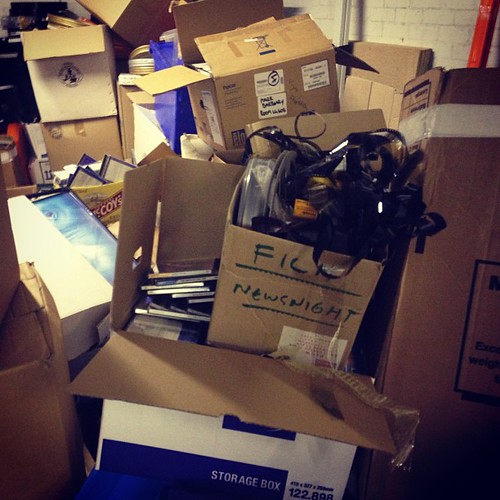Newsnight to be cut to 30-minute show as part of BBC’s £500m savings plan
Newsnight #Newsnight

The BBC’s Newsnight is to be cut to a 30-minute programme as part of the corporation’s wider plans to make £500 million of savings, it has announced.
The long-running nightly current affairs show on BBC Two will continue to air on weeknights as an “interview, debate and discussion show” but more than half of Newsnight’s 60 jobs will go.
As part of the further changes, an extended hour-long edition of BBC News At One will relocate to Salford, while BBC Breakfast, also broadcast from Salford, will be extended by an extra 15 minutes daily, the corporation said.
The corporation expects the raft of changes to save £7.5 million as its continues to seek ways to cut costs in the face of high inflation and a licence fee freeze.
Responding to the news, former Newsnight presenter Emily Maitlis said there is an “irony” that the BBC show has been scaled back after it had to “fight” to take risks with its journalism.
Following the announcement, BBC News and Current Affairs chief executive Deborah Turness said: “Like many businesses, we are in a tough financial climate and, as our audiences shift rapidly from TV to online news consumption, we need to make choices about where we allocate our resources.
“While TV and radio remain crucial to BBC News, we must invest in our digital platforms to ensure they are also the home of our very best journalism, and today’s package of measures will accelerate this transformation.”
Referring to the decision to shorten BBC 2’s Newsnight by around 10 minutes, she said: “Audiences have told us how much they value Newsnight as an iconic BBC debate and discussion programme, and we’ve listened to what they’ve said – we’ve made the decision to keep the programme on air five days a week, despite the financial challenges we face.
“We will offer more to audiences by investing to ensure the best investigative journalism and reporting is produced – and consumed – across the whole of BBC News.”
More focus will be put on digital storytelling and live coverage across the BBC News division, with a “reduction in the amount of television packaging”.
The broadcaster is also planning to create a new BBC News investigations unit, while it will boost its BBC Verify section with new reporting and production roles.
Investigative documentary series Panorama is set to continue as the flagship current affairs brand on BBC One, with no change in the number of hours, the corporation said.
BBC News and Current Affairs chief Deborah Turness said the corporation needs to make choices about resources amid financial challenges (Danny Lawson/PA)
In a blog post shared on Wednesday, Ms Turness said when they started work on the announcement about the changes at the corporation she “did not know if it would make financial sense to keep Newsnight on air”.
She wrote: “From its inception nearly 44 years ago, when it was introduced to bring viewers analysis and in-depth coverage of the day’s news, Newsnight has made an impact.
“We’ll all have our own memories of Newsnight – from Jeremy Paxman famously repeating the same question to Michael Howard, to the Prince Andrew interview.”
She added that audiences today are consuming news differently and said: “The news is, quite literally, at their fingertips.
“They are listening to podcasts, when and where they want, in which they join a community of listeners and feel part of the conversation. Linear TV is in decline, and Newsnight’s viewing figures reflect this general trend.
“So I will be frank – when we started work on this announcement, I did not know if it would make financial sense to keep Newsnight on air. We, like many other news organisations, have streamlined our editorial teams to avoid duplication.
“It simply no longer makes sense to keep a bespoke reporting team dedicated to a single news programme with a small and declining audience, however good that programme is.”
But Ms Turness said the BBC has listened to its “most crucial voice”, the audience, and as such made the decision to re-format Newsnight.
Kirsty Wark will be stepping down as the lead presenter of Newsnight (Jane Barlow/PA)
Last month it was announced that Kirsty Wark would be stepping down as the lead presenter of Newsnight after the next election, having presented the programme for three decades.
The 68-year-old will continue to present BBC shows including The Reunion, Start The Week on Radio 4, and documentaries, the corporation said.
Former Newsnight presenter Emily Maitlis, who joined the BBC in 2001 and had presented Newsnight from 2006, left the corporation in February 2022 for rival media group Global, and now hosts its The News Agents podcast with former BBC colleague Jon Sopel.
During Maitlis’s tenure at Newsnight, she famously interviewed the Duke of York in November 2019 when he was grilled over his relationship with late billionaire sex offender Jeffrey Epstein.
Responding to a tweet by former colleague Hannah Barnes reacting to the news, who said she felt the cuts made “a small saving for such a huge loss”, Maitlis wrote: “Hannah’s extraordinary and exceptional journalism is a class example of what will now be lost @BBCNewsnight.
“The irony is how hard and how often @bbcnewsnight had to fight other parts of the BBC to be allowed to make risk taking, policy changing, award winning journalism.”
The Duke of York spoke about his links to Jeffrey Epstein in an interview with Emily Maitlis for BBC Newsnight (Mark Harrison/BBC/PA)
Following the Newsnight broadcast and the furore over Andrew’s friendship with Epstein, the duke stepped down from public life.
In 2020 the BBC ruled that a monologue Maitlis had delivered on Newsnight, about the row over Dominic Cummings’ trip to Barnard Castle during the pandemic, breached impartiality rules.
The broadcaster received more than 20,000 complaints and said in a statement: “We believe the introduction we broadcast did not meet our standards of due impartiality.”